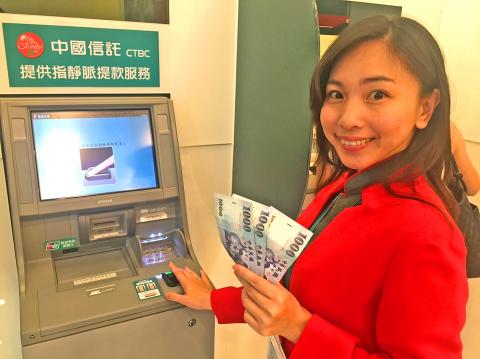CTBC Bank Co Ltd (中國信託銀行) yesterday unveiled a number of key technologies to back its transition toward the digitization of financial services, or the so-called “Bank 3.0.”
A pilot program utilizing biometirc security and mobile devices began yesterday for employees working at the 3 hectare CTBC Financial Park in Taipei’s Nangang Business Park, the company said.
The bank plans to extend the digitized services to consumers in about six months, it said.

Photo: CNA
The bank is also implementing finger vein scanning and facial recognition at its automatic teller machines (ATM), which would allow customers to withdraw money without having to use a bank card or PIN.
The finger vein technique was pioneered by the Japanese firm Hitachi Ltd and is based on the unique pattern of veins inside a finger. Only a living finger is accepted by the scanner, which is believed to make vein recognition a more secure technology than fingerprint scanning.
The finger vein sensor has a false match rate of 0.01 percent, and its accuracy in measuring the blood flow of a user for identity authentication is unaffected by variations in age and physical condition, the bank said, citing findings by US-based International Biometric Group.
The technology is already in use in some bank ATMs in Japan and Poland.
CTBC Bank said it has begun using tablets to cut down on waiting times for customers visiting branch office and is planning to transform smartphones into wallets by adding near field communication and QR Code scanning capabilities.
Consumers would to be able to make deposits, send wire transfers and take out loans by using the bank’s ATMs in 24-hour convenience stores, it said.
The digitized services are still awaiting regulatory approval and their implementation will require the consent of customers, CTBC Bank said.
However, the company said that more than 60 percent of customers still prefer face-to-face service, based on a study by Ernst & Young last year.
Additional reporting by staff writer

TAKING STOCK: A Taiwanese cookware firm in Vietnam urged customers to assess inventory or place orders early so shipments can reach the US while tariffs are paused Taiwanese businesses in Vietnam are exploring alternatives after the White House imposed a 46 percent import duty on Vietnamese goods, following US President Donald Trump’s announcement of “reciprocal” tariffs on the US’ trading partners. Lo Shih-liang (羅世良), chairman of Brico Industry Co (裕茂工業), a Taiwanese company that manufactures cast iron cookware and stove components in Vietnam, said that more than 40 percent of his business was tied to the US market, describing the constant US policy shifts as an emotional roller coaster. “I work during the day and stay up all night watching the news. I’ve been following US news until 3am

UNCERTAINTY: Innolux activated a stringent supply chain management mechanism, as it did during the COVID-19 pandemic, to ensure optimal inventory levels for customers Flat-panel display makers AUO Corp (友達) and Innolux Corp (群創) yesterday said that about 12 to 20 percent of their display business is at risk of potential US tariffs and that they would relocate production or shipment destinations to mitigate the levies’ effects. US tariffs would have a direct impact of US$200 million on AUO’s revenue, company chairman Paul Peng (彭雙浪) told reporters on the sidelines of the Touch Taiwan trade show in Taipei yesterday. That would make up about 12 percent of the company’s overall revenue. To cope with the tariff uncertainty, AUO plans to allocate its production to manufacturing facilities in

Six years ago, LVMH’s billionaire CEO Bernard Arnault and US President Donald Trump cut the blue ribbon on a factory in rural Texas that would make designer handbags for Louis Vuitton, one of the world’s best-known luxury brands. However, since the high-profile opening, the factory has faced a host of problems limiting production, 11 former Louis Vuitton employees said. The site has consistently ranked among the worst-performing for Louis Vuitton globally, “significantly” underperforming other facilities, said three former Louis Vuitton workers and a senior industry source, who cited internal rankings shared with staff. The plant’s problems — which have not

COLLABORATION: Given Taiwan’s key position in global supply chains, the US firm is discussing strategies with local partners and clients to deal with global uncertainties Advanced Micro Devices Inc (AMD) yesterday said it is meeting with local ecosystem partners, including Taiwan Semiconductor Manufacturing Co (TSMC, 台積電), to discuss strategies, including long-term manufacturing, to navigate uncertainties such as US tariffs, as Taiwan occupies an important position in global supply chains. AMD chief executive officer Lisa Su (蘇姿丰) told reporters that Taiwan is an important part of the chip designer’s ecosystem and she is discussing with partners and customers in Taiwan to forge strong collaborations on different areas during this critical period. AMD has just become the first artificial-intelligence (AI) server chip customer of TSMC to utilize its advanced